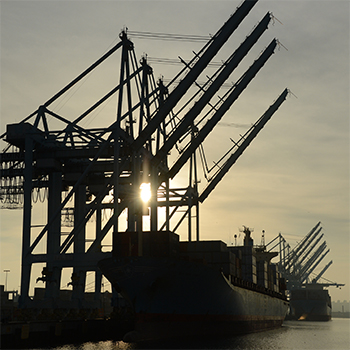The Risk of Disruption at West Coast Ports by Thanksgiving is Increasing Daily

West Coast port slowdown raises fears of dockworker strike or lockout - business groups are urging that a federal mediator help the two sides in port negotiations reach an agreement.
For months, contract negotiations between a powerful union and multinational shipping lines progressed amicably in public, even though roughly 20,000 West Coast dockworkers labored without a contract.
Now the public harmony has been shattered, raising fears that a strike or lockout could close ports up and down the coast and cause economic pain.
The Pacific Maritime Association, which represents employers operating port terminals and shipping lines, has accused the International Longshore and Warehouse Union of deliberately slowing operations at four major West Coast ports, including Los Angeles and Long Beach - the nation’s busiest complex.
The union, in turn, has expressed mounting irritation with a lack of progress toward a new contract. On Monday, the union decried what it called management’s “deceitful media tactics,” which the union said are designed to blame it for brutal congestion at West Coast ports.
The public sniping, experts said, signals that both sides have grown frustrated and probably have come to an impasse at the negotiating table.
“The risk of disruption at West Coast ports by Thanksgiving is increasing day by day,” international trade economist Jock O’Connell said.

Noting a tentative agreement on healthcare reached in August, O’Connell said unresolved issues probably involve automation and whether certain jobs will be done off the docks or by the union. During negotiations, management can rely on outside business groups to pressure workers, while the union can push back through slowdowns, O’Connell said.
“Apparently that’s what they are doing,” he said.
Asked to respond to the slowdown accusations, a union spokesman did not directly address the claims.
“Workers are frustrated because employers have delayed action for years on the underlying issues that created the port congestion … including many of their own making, and have also been delaying resolution of the contract talks for many months,” spokesman Craig Merrilees said.
A six-year agreement covering nearly 20,000 dockworkers at 29 West Coast ports expired July 1. The sides have been negotiating since May. In 2002, amid talks for a previous contract, employers accused the union of go-slow tactics, then locked out dockworkers for 10 days, shutting down ports along the West Coast.
Some businesses are worried that ports could be shut down again. In response to rising tensions, the National Retail Federation and other business groups sent a letter Thursday to President Obama, urging that a federal mediator help the two sides reach an agreement.
“The sudden change in tone is alarming and suggests that a full shutdown of every West Coast port may be imminent,” the groups said in their letter. “The impact this would have on jobs, down-stream consumers, and the business operations of exporters, importers, retailers, transportation providers, manufacturers and other stakeholders would be catastrophic.”
Businesses Urge Presidential Involvement in Port Dispute
A diverse coalition including retailers, manufacturers and farmers and other supply chain stakeholders sent a letter to President Obama today urging the government’s immediate involvement in contract negotiations between the Pacific Maritime Association and the International Longshore and Warehouse Union. Management and labor have held talks since May but have yet to approve a final agreement on a contract that expired July, which covers dockworkers at 29 West Coast ports.
While the two parties have said they would remain at the negotiating table until a new deal is struck, recent labor activities – most recently at the Port of Seattle and Port of Tacoma – have led to a noticeable uptick in rhetoric and tensions that is causing the nation’s importers and exporters anxiety and alarm.
“The sudden change in tone is alarming and suggests that a full shutdown of every West Coast port may be imminent,” the letter said. “The impact this would have on jobs, down-stream consumers, and the business operations of exporters, importers, retailers, transportation providers, manufacturers, and other stakeholders would be catastrophic.”
The coalition, led by the National Retail Federation, detailed the impact of a port shutdown, including damaging the viability of the West Coast ports and the economic consequences of disrupting the supply chain. NRF and the National Association of Manufacturers issued an economic analysis in June that found a port shutdown would cost the economy approximately $2 billion a day.
The group called on the Administration to become engaged in the contract negotiations before a disruption can occur, and recommended the use of a federal mediator to forestall any threat of a management-directed lockout or labor-initiated strike.
“We believe immediate action is necessary and the federal government’s use of all of its available options would be helpful in heading off a shutdown and keeping the parties at the negotiating table,” the letter said. “This includes encouraging the parties to begin working with a federal mediator through the Federal Mediation and Conciliation Service.”
A shutdown would carry an economic hit; 12.5% of the nation’s gross domestic product is linked to cargo flowing through West Coast ports, according to the Pacific Maritime Assn. But just how severe a closure would be is difficult to judge.
During a shutdown, cargo isn’t simply dumped into the ocean, complicating accurate estimates of lost economic productivity. Certain food products may perish, but most cargo would be diverted elsewhere or shipped through the West Coast when ports reopened.
That may require discounts, however, and may lead to losses. Furthermore, some workers - including 20,000 dockworkers - would sit idle and not collect a paycheck.
At the twin ports of L.A. and Long Beach, management said the union has refused to dispatch hundreds of skilled workers who operate cranes to lift cargo containers onto trucks and rail cars.
The action, the maritime association said, could cripple the nation’s largest port complex, which is already suffering from the worst congestion in a decade. In recent weeks, ships have been anchored off the Los Angeles coastline for days as they wait for cargo languishing on the docks to clear.
The congestion stems from several factors, including a surge of cargo before the holidays, an increase of massive container ships that are deluging the docks with cargo, and a shortage of trailers that truckers use to haul containers from the ports to sprawling warehouses in the Inland Empire.
Officials at the ports of Los Angeles and Long Beach said congestion hasn’t increased over the last week. Management said the slowdowns began in Tacoma, Wash., on Oct. 31 and spread to Seattle that weekend, with L.A. and Long Beach joining on Nov. 3.
The public sparring, however, doesn’t increase the likelihood of a strike or lockout, said Harley Shaiken, a UC Berkeley professor who specializes in labor issues. The fact that both sides have negotiated four months past the contract’s expiration shows that workers and management want to come to an agreement without a work stoppage and believe that they can, he said.
West Coast ports face increased competition from facilities nationally and abroad, and neither side wants to give importers and exporters a reason to go elsewhere, Shaiken said.
“If there is a slowdown, it’s meant to spur the negotiations, not to torpedo them,” he said.
Aside from the contract roadblock, L.A.-area dockworkers may soon face a choice of whether to walk off the job, at least temporarily.
Some port truck drivers told the Los Angeles Board of Harbor Commissioners on Friday that they are ready to strike again after they put down picket signs in July after a request from L.A. Mayor Eric Garcetti. The drivers say several companies continue to improperly classify them as independent contractors, leaving them with fewer workplace protections and lower pay than if they were company employees.
“It’s a wild card,” Shaiken said. “Will the longshoremen honor the picket lines if they are set up?”
Source: Los Angeles Times
Related Article: What’s Your Plan if There’s a West Coast Port Strike?

Article Topics
National Association of Manufacturers News & Resources
Manufacturers launch digital series highlighting innovation Caterpillar Foundation grant supports expanded U.S. veteran workforce development NAM’s final manufacturing survey for 2020 finds cautious optimism Manufacturing Leadership Council releases Covid-19 operating practices from leading manufacturers Manufacturers release ‘American Renewal Action Plan’ Business Roundtable, NAM combine COVID-19 response efforts to address critical shortages Manufacturers: Congressional action needed to aid COVID-19 response More National Association of ManufacturersLatest in Transportation
Ranking the World’s 10 Biggest Supply Chains The Top 10 Risks Facing Supply Chain Professionals Walmart’s Latest Service: Ultra Late-Night Delivery City of Baltimore Files Lawsuit to Recoup Money for Collapsed Bridge The Era of Self-Driving Tractor-Trailers Set to Begin Is the Trailers as a Service (TaaS) Model Right For Your Business? Why Grocery Shoppers are Leaving Stores to Buy Their Food Online More Transportation














